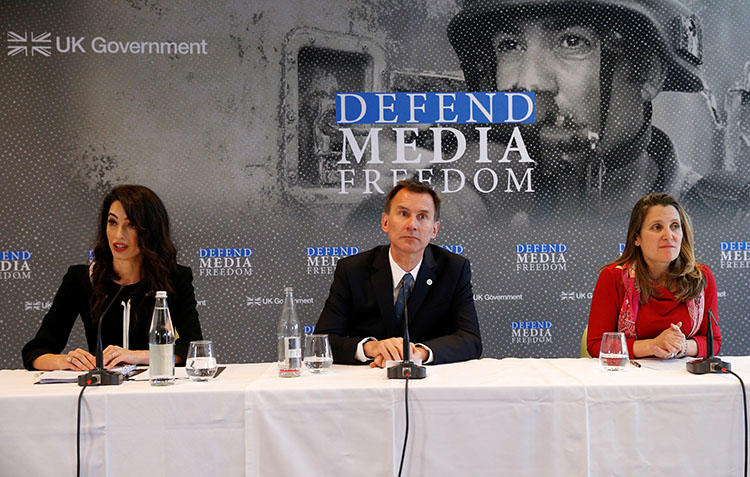When the U.K. launched an initiative to support media freedom in the waning days of Jeremy Hunt’s tenure as foreign minister, CPJ was skeptical that this government-led effort would be more than a feel-good campaign. However, we chose to engage, given the current vacuum of leadership on press freedom globally. As the U.S. pulls back from its historic support, we need other countries to step up — including the U.K. and Canada, which in July published a global pledge on media freedom.
But we also need governments to take action, not just make rhetorical pledges.
That is why CPJ endorsed a report on the use of targeted sanctions to protect journalists released today by a panel of legal experts convened by the U.K.’s special envoy for media freedom, international human rights lawyer Amal Clooney.
Clooney, who authored the report, recommends that governments use targeted sanctions such as travel bans and asset freezes to punish and deter serious press freedom violators, including those who murder or jail journalists. It calls on signatories of the media freedom pledge to introduce and amend what have become known as “Magnitsky” laws. The reference is to Russian lawyer Sergei Magnitsky, who died in prison in 2009 after exposing official corruption.
The report assesses the limited number of countries where Magnitsky laws have been adopted or are under consideration, and recommends their expansion to respond to a wider array of abuses against journalists and “systemic restrictions on the media,” including abduction, physical violence, arbitrary detention, and wide scale censorship, including of the internet. It makes the case that both state and non-state actors, such as companies, should be included as potential targets. It notes that sanctions not only curb access to financial gain and luxury goods but can also isolate perpetrators and deter copycats.
“At a time when multilateral efforts to enforce human rights through the UN Security Council and international criminal courts are in decline, targeted sanctions can be one of the few ways, or in some cases the only way, to enforce international norms,” Clooney writes in the report.
Download and read the full report here.
